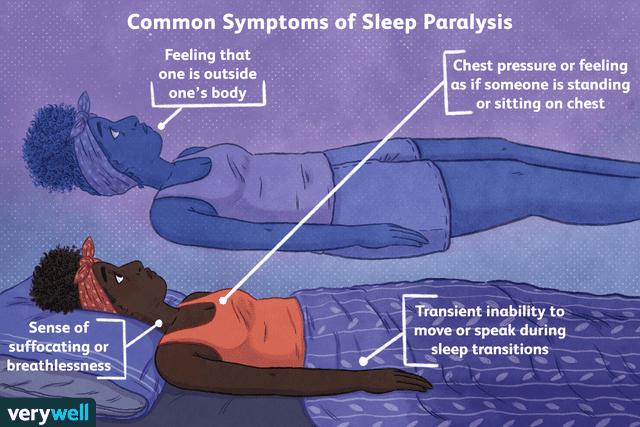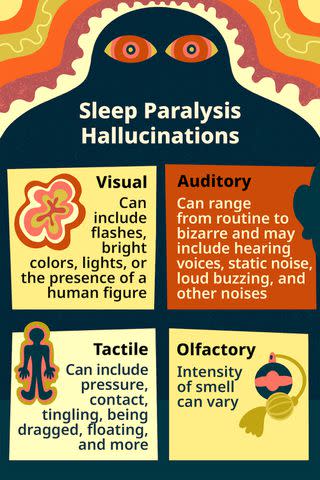Describing Sleep Paralysis Hallucinations
Sleep paralysis can be accompanied by frightening hallucinations
Medically reviewed by Sanja Jelic, MD
Sleep paralysis hallucinations are symptoms of sleep paralysis, a phenomenon in which you are temporarily unable to move or speak as you transition from sleep to consciousness. These hallucinations are different from normal dreaming. You might see, hear, or feel things that are not there. For example, you may feel like someone touched you while you were sleeping, even though no one else was in the room.
Sensing danger, feeling suffocated, and feeling like you are having an "out-of-body" experience are other common sleep paralysis hallucinations. Sometimes people even see threatening imaginary creatures, known as "sleep demons."
This article will explain what sleep paralysis feels like, what people may see when they have sleep paralysis hallucinations, and how to prevent them.
Takeaway
Sleep paralysis demons were first identified in 1664 by a Dutch physician, who believed they were caused by a demon-like creature that attacked its victims as they slept.
What Does Sleep Paralysis Feel Like?
Normally, you have smooth transitions between different phases of sleep. But when a transition is interrupted, you might experience sleep paralysis. This can happen either when you first fall asleep or when you're about to wake up.

Verywell / Brianna Gilmartin
Symptoms of sleep paralysis include:
Inability to move or talk during sleep transitions
Trying unsuccessfully to cry or scream for help
Limited eye movement
A sensation of suffocation or breathlessness
Feeling like someone is sitting or standing on your chest
Out-of-body experience (like you're looking down at yourself)
Hallucinations
These symptoms often last for several minutes. They occur when there’s a disruption in the transition from rapid eye movement (REM) sleep to wakefulness. During REM sleep, your body is in a state of muscle relaxation. If your mind is awake and aware during this transition, you may be temporarily conscious but unable to move.
Takeaway
The level of awareness during sleep paralysis varies. Some people claim they're completely awake and aware of their surroundings. Others describe only partial awareness.
What Happens During Sleep Paralysis Hallucinations?

Illustration by Ellen Lindner for Verywell Health
You may have vivid hallucinations during sleep paralysis. With these, you feel like you're experiencing something that isn't actually occurring.
The hallucinations linked to sleep paralysis fall into four categories based on which senses they affect:
Visual (vision)
Auditory (hearing)
Olfactory (smell)
Tactile (touch)
Sleep paralysis hallucinations are not related to the types of hallucinations that may occur in people with schizophrenia.
Visual Hallucinations
Symptoms of visual hallucinations can include seeing:
Flashes
Bright colors
Lights
Presence of a figure
These visions can be intense. Many people report the presence of a human figure, often described as a dark figure, shadow, or ghost. This figure may be standing at the bedside, just at the edge of their vision. Some people report seeing several people in the room.
Sometimes the visual hallucination can be very detailed. For example, some have reported seeing a hand not attached to a body, a gargoyle, bugs, or even a cat.
In other cases, people have vague visions that are blurry or shimmering. They might also have a sense that things in the room are floating.
Auditory Hallucinations
Similarly, the auditory (hearing) hallucinations in sleep paralysis can range from routine to bizarre. Many people hear various noises, but hearing voices is the most common. The voices may sound like whispers, screams, or laughter.
Almost as often, people report hearing a loud buzzing or static noise. It may sound like a radio that's on but not tuned to a station. Some people hear breathing, footsteps, knocking, or a ringing sound. Others might hear unusual sounds like a horse carriage or growling.
The sounds aren't always specific. They can be hard to describe or remember.
Tactile Hallucinations
Tactile hallucination is the experience of feeling like you're being touched when you're not. It's one of the most common aspects of sleep paralysis. Many people say they feel like someone else is touching them while they sleep. They also describe pressure as if something or someone is holding them down.
Some people with sleep paralysis report tingling, numbness, or a vibrating sensation. Others describe a sense of floating, flying, or falling. A few people report feeling chilled or freezing.
Less often, people feel like they're being physically moved or dragged from their beds. Some people report feelings of sexual contact, including physical sensations involving their genital areas.
Other physical experiences that people have reported include:
Sense of getting bitten
Bugs crawling on the skin
Breathing in the ear
An uncontrolled feeling of smiling
Olfactory Hallucinations
The least common hallucination in sleep paralysis is olfactory (sense of smell). Like the other types of hallucinations, the intensity of the smells varies.
What Causes Sleep Paralysis Hallucinations?
There is no established cause of sleep paralysis hallucinations, though it is thought they may be associated with:
Anxiety disorders
Poor sleep quality
Alcohol consumption
Traumatic events
A family history of sleep paralysis
Related: Can Sleep Deprivation or Insomnia Cause Hallucinations to Occur?
How Sleep Paralysis Hallucinations Make You Feel
An important and lasting element of sleep paralysis is the emotional component.
For many, the experience of sleep paralysis is a waking nightmare. For example, the dark figure you sense in the room seems to be an evil presence, intent on real harm. Or the stranger standing over you or sitting on top of you is threatening or intimidating.
Most people who experience sleep paralysis describe it as a scary or horrifying experience. This is often related to the hallucination of a stranger’s presence. Some people have a sense of impending doom, or they feel that real harm or death is coming for them.
Takeaway
When you first experience sleep paralysis, it may feel like you had a stroke that resulted in locked-in syndrome. With this, you're conscious but unable to move anything except for your eyes.
Many people describe how real everything seems when it's happening. It's common for people to use the words "weird" and "strange" to describe their experiences.
People might summarize their sleep paralysis as shocking, worrisome, or disgusting. They may say it left them scared, angry, or helpless. Rarely, some people describe the experience as comforting.
Related: Causes and Risk Factors of Sleep Paralysis
How to Prevent Sleep Paralysis Hallucinations
Sleep paralysis doesn't tend to affect people frequently. Once you understand what it is and why it happens, it might not bother you as much. Practicing good sleep hygiene may help prevent episodes of sleep paralysis. Some general tips:
Make sure you're getting enough sleep.
Try to wake up and go to bed at the same time every day.
Avoid alcohol and caffeine in the hours before bedtime.
Try to sleep on your side. Sleeping on your back may make sleep paralysis more likely to occur.
Turn off your phone and other digital devices before bed.
De-stress before bed by meditating, listening to music, or taking a warm bath.
Related: What Is Sleep Hygiene?
How to Cope With Sleep Paralysis Hallucinations
If sleep paralysis happens often, you might be able to develop strategies to make it less distressing. For example, focusing on one moving one small part of your body such as a finger may help you come out of the paralysis more quickly. It can also help to remind yourself to stay calm and think about how you are breathing.
Remember that what you're experiencing is normal and try to reassure yourself that any hallucinations you're having aren't real.
Summary
During sleep paralysis—a phenomenon in which you are temporarily unable to move as you transition from being asleep to being awake—it is possible to hallucinate and think you're seeing, hearing, smelling, or feeling something that's isn't actually there. It can be a scary feeling, but it's usually not a sign of anything serious.
Sleep paralysis hallucinations may be preventable by maintaining a regular sleep routine. If you experience sleep paralysis, a board-certified sleep doctor may be able to help you.
Read the original article on Verywell Health.
